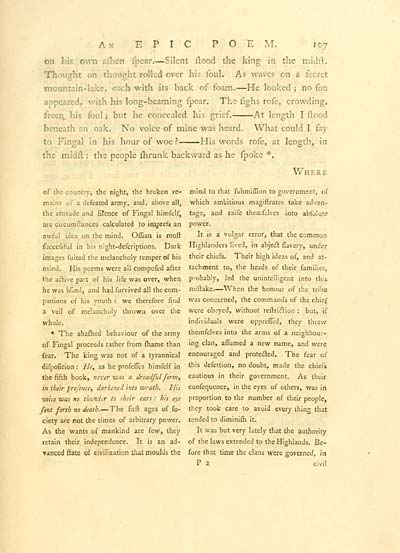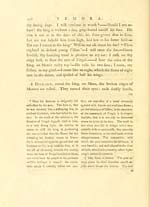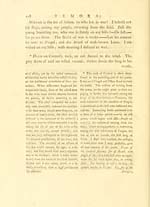Download files
Complete book:
Individual page:
Thumbnail gallery: Grid view | List view

An
EPIC
P O E M.
IG7
on his own afl'ien Ipear. — Silent ilood the king in the midlT:.
Thought on thought rolled over his ibul. As waves on a fecret
mountain-lake, each with its back of foam. — He looked ; no fon
appeared, with his long-beaming fpear. Ths fighs rofe, crowding,
from^ his foul; but he concealed his grief. At length I flood
beneath an oak. No voice of mine was heard. What could I fay
to Fingal in his hour of woe ? His words rofe, at length, in
the midll : the people fhrunk backward as he fpoke *.
Where
of the countrj', the night, the broken re-
mains of a defeated army, and, above all,
the attitude and filence of Fingal himfelf,
are circumRances calculated to imprefs an
awful idea on the mind. Oflian is moft
fuccefsful in his night-defcriptions. Dark
images fuited the melancholy temper of his
mind. His poems were all compofed after
the active part of his life was over, when
he was blind, and had furvived all the com-
panions of his youth : we therefore find
a veil of melancholy thrown over the
whole.
• The abafhed behaviour of the army
of Fingal proceeds rather from fhame than
fear. The king was not of a tyrannical
difpofition : He, as he profefles himfelf in
the fifth book, never was a dreadful form,
in their frefence, darkened into wrath. His
voice was no thundit to their ears : hit eye
ftnt forth no death. — The firft ages of fo-
ciety are not the times of arbitrary power.
As the wants of mankind are few, they
retain their independence. It is an ad-
vanced ftate of civilization that moulds the
mind to that fubmiffion to government, of
which ambitious magiftrates take advan-
tage, and raife themfelves into abfolute
power.
It is a vulgar error, that the common
Highlanders lived, in ahje£l flavery, under
their chiefs. Their high ideas of, and at-
tachment to, the heads of their families,
p'obably, led the unintelligent into this
miftake. — When the honour of the tribe
was concerned, the commands of the chief
were obeyed, without reftriftion : but, if
individuals were opprefled, they threw
themfelves into the arms of a neighbour-
ing clan, afliimed a new name, and were
encouraged and protedled. The fear of
this defertion, no doubt, made the chiefs
cautious in their government. As their
confequence, in the eyes of others, was ia
proportion to the number of their people,
they took care to avoid every thing that
tended to diminifli it.
It was but very lately that the authority
of the laws extended to the Highlands. Be-
fore that time the clans were governed, in
P 2 civil
EPIC
P O E M.
IG7
on his own afl'ien Ipear. — Silent ilood the king in the midlT:.
Thought on thought rolled over his ibul. As waves on a fecret
mountain-lake, each with its back of foam. — He looked ; no fon
appeared, with his long-beaming fpear. Ths fighs rofe, crowding,
from^ his foul; but he concealed his grief. At length I flood
beneath an oak. No voice of mine was heard. What could I fay
to Fingal in his hour of woe ? His words rofe, at length, in
the midll : the people fhrunk backward as he fpoke *.
Where
of the countrj', the night, the broken re-
mains of a defeated army, and, above all,
the attitude and filence of Fingal himfelf,
are circumRances calculated to imprefs an
awful idea on the mind. Oflian is moft
fuccefsful in his night-defcriptions. Dark
images fuited the melancholy temper of his
mind. His poems were all compofed after
the active part of his life was over, when
he was blind, and had furvived all the com-
panions of his youth : we therefore find
a veil of melancholy thrown over the
whole.
• The abafhed behaviour of the army
of Fingal proceeds rather from fhame than
fear. The king was not of a tyrannical
difpofition : He, as he profefles himfelf in
the fifth book, never was a dreadful form,
in their frefence, darkened into wrath. His
voice was no thundit to their ears : hit eye
ftnt forth no death. — The firft ages of fo-
ciety are not the times of arbitrary power.
As the wants of mankind are few, they
retain their independence. It is an ad-
vanced ftate of civilization that moulds the
mind to that fubmiffion to government, of
which ambitious magiftrates take advan-
tage, and raife themfelves into abfolute
power.
It is a vulgar error, that the common
Highlanders lived, in ahje£l flavery, under
their chiefs. Their high ideas of, and at-
tachment to, the heads of their families,
p'obably, led the unintelligent into this
miftake. — When the honour of the tribe
was concerned, the commands of the chief
were obeyed, without reftriftion : but, if
individuals were opprefled, they threw
themfelves into the arms of a neighbour-
ing clan, afliimed a new name, and were
encouraged and protedled. The fear of
this defertion, no doubt, made the chiefs
cautious in their government. As their
confequence, in the eyes of others, was ia
proportion to the number of their people,
they took care to avoid every thing that
tended to diminifli it.
It was but very lately that the authority
of the laws extended to the Highlands. Be-
fore that time the clans were governed, in
P 2 civil
Set display mode to: Large image | Transcription
Images and transcriptions on this page, including medium image downloads, may be used under the Creative Commons Attribution 4.0 International Licence unless otherwise stated. ![]()
| Early Gaelic Book Collections > Ossian Collection > Temora, an ancient epic poem, in eight books > (119) |
|---|
| Permanent URL | https://digital.nls.uk/82194727 |
|---|
| Description | Selected books from the Ossian Collection of 327 volumes, originally assembled by J. Norman Methven of Perth. Different editions and translations of James MacPherson's epic poem 'Ossian', some with a map of the 'Kingdom of Connor'. Also secondary material relating to Ossianic poetry and the Ossian controversy. |
|---|
| Description | Selected items from five 'Special and Named Printed Collections'. Includes books in Gaelic and other Celtic languages, works about the Gaels, their languages, literature, culture and history. |
|---|

